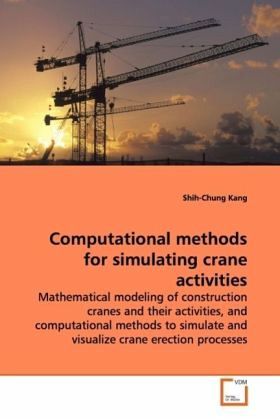
Computational methods for simulating crane activities
Mathematical modeling of construction cranes and their activities, and computational methods to simulate and visualize crane erection processes
Versandkostenfrei!
Versandfertig in 6-10 Tagen
45,99 €
inkl. MwSt.

PAYBACK Punkte
23 °P sammeln!
The efficiency of crane operations in constructionmay significantly impact on the schedule and cost ofa construction project. This book presentscomputational methods required to simulate craneactivities with goal of improving crane erectionprocesses. A computer system that integrates thecomputational methods is developed. This system isreferred to as iCrane, which stands for intelligentcrane, and is for use both before and duringerection. At its core, the computer system allowsusers to simulate the erection process virtually,prior to field operations. These methods canpotentially benefit many ...
The efficiency of crane operations in construction
may significantly impact on the schedule and cost of
a construction project. This book presents
computational methods required to simulate crane
activities with goal of improving crane erection
processes. A computer system that integrates the
computational methods is developed. This system is
referred to as iCrane, which stands for intelligent
crane, and is for use both before and during
erection. At its core, the computer system allows
users to simulate the erection process virtually,
prior to field operations. These methods can
potentially benefit many construction practitioners:
engineers for crane selection or crane placement;
logistics planners for generating precise and
detailed erection plans prior to construction;
construction managers for choosing optimal locations
for material delivery and temporary onsite storage;
cost estimators for increasing the accuracy of the
cost forecasts and cashflow projections. Crane
operators and trainers can also use the crane
simulation for providing instruction. Crane
researchers can simulate erection processes before
construction. Robot developers may also find this
book useful.
may significantly impact on the schedule and cost of
a construction project. This book presents
computational methods required to simulate crane
activities with goal of improving crane erection
processes. A computer system that integrates the
computational methods is developed. This system is
referred to as iCrane, which stands for intelligent
crane, and is for use both before and during
erection. At its core, the computer system allows
users to simulate the erection process virtually,
prior to field operations. These methods can
potentially benefit many construction practitioners:
engineers for crane selection or crane placement;
logistics planners for generating precise and
detailed erection plans prior to construction;
construction managers for choosing optimal locations
for material delivery and temporary onsite storage;
cost estimators for increasing the accuracy of the
cost forecasts and cashflow projections. Crane
operators and trainers can also use the crane
simulation for providing instruction. Crane
researchers can simulate erection processes before
construction. Robot developers may also find this
book useful.












